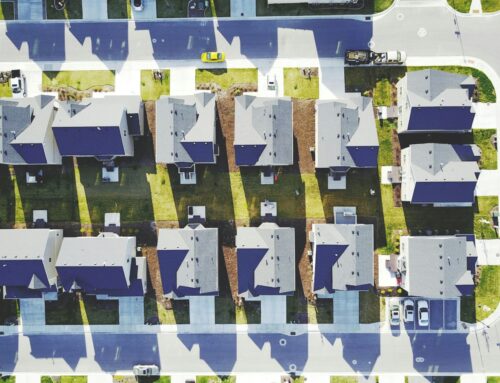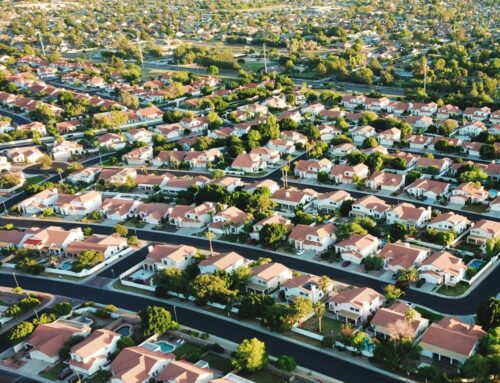What is Inflation
& How it Will Affect Real Estate in Your Area?
Inflation has been a hot-topic for the past year, growing in popularity as the pandemic rattled supply chains, consumer confidence, and overall economic stability. It came to our attention that not a lot of people really know how inflation works. Moreover, fewer still know how it can affect the real-estate market. Let’s take a quick look at what inflation is, and how it will affect your interests in the real-estate market.
What Is Inflation?
Inflation is defined as the rate at which prices increase over a period of time. That seems simple enough, and we all understand, generally, price increases and how they’ve affected our lives. We may remember the dollar movie theaters and cheap refreshments, but inflation has pushed movie going experiences for an individual well above $20 for a similar experience. We can also look at the cost of gas, cars, and, of course, home values as prime examples of inflation throughout the years. NPR just did a vlog article recently about the impact of inflation from pre and post pandemic prices, and noticed around a 20% increase in staples.
What Causes Inflation?
This is where things get complicated. We all know the cost of goods and services largely depends on supply and demand. These calculations drive a large part of why things cost as much as they do. As shipping and labor costs go up, so do costs of materials and onward up the chain to the product itself. Another cause of inflation is money flow: the movement of currency in an economy. As consumers consider their finances, they may choose to spend more or less in an economy, which can have an inflationary or deflationary effect respectively. A third stimulus of inflation is monetary policy. This is probably the most difficult part of inflation to understand. As the Federal Reserve prints money to loan to banks and Congress, the purchasing power of that currency can fluctuate. To deter the shrinking of purchasing power, and thereby put-off inflation, the Federal Reserve uses interest rate increases to balance the flow of money. Higher rates mean less loans, which is another mechanism of money creation in the system. The more loans that are created, the more money is created in the economy, and the purchasing power of the dollar decreases, which continues driving inflation. As you can see, all three of these major factors have played a role in inflation over the past few years, thanks in large part to the pandemic.
How Will Inflation Affect The Real Estate Market?
Over the past 50 years or so, inflation has been most visible in the housing market. This is, after all, where most loans are created for the public. It therefore makes sense that inflation should sit heavily in this market, though it has a deleterious effect on the staples of living as well (food, water, heating, gas, etc.). 2023’s real estate statistics are already showing the effects of inflation and the Federal Reserve’s monetary policies as they try to stave off inflation. Over the past few years, with record low interest rates, we saw housing values skyrocket. In some areas, the median home value rose 30-70% over pre-pandemic value. That amount of growth in just 2 years is unprecedented and, indeed, inflationary. During this time, the Federal Reserve also printed unprecedented amounts of money to keep our economy afloat.
As we watch interest rates climb to and above 7%, the housing market is also the first place we start seeing changes. Home values are leveling off in some areas, but continue to climb at a slower pace. Buyers are exiting the market as monthly mortgage payments rise out of their price range with these interest rates. “For Sale” signs are lingering in lawns a little longer and longer each month. Some are whispering that there is another “housing bubble” about to pop with these post-pandemic prices. That’s not how inflation will impact the housing market, though. Prices will continue to rise, even if slowly; especially in prime real estate areas like Colorado and Longmont, in particular.
How To Protect Yourself During Inflation?
If you’re looking to enter the real estate market, whether to buy or sell, it’s important to understand how money flow, interest rates, and your savings will impact your real estate journey. When looking to buy a new home during inflationary times, you’ll want to buy quickly. Secure your loans as soon as possible, locking in a lower interest rate and ensuring your down payment has as much purchasing power as it can. With higher interest rates, you’ll want a larger down payment. This will lower monthly mortgage payments, and as inflation increases, decreasing expenses will be essential.
There are many other methods of protecting yourself from inflation. One includes gardening and growing your own food (whether indoors or outdoors). There are lots of low-water and minimal-space gardening methods now. Reducing the need for electricity in your home. Focus spending habits on important things to you, like car repairs, essentials for the home, and celebratory social gatherings. If you want to protect yourself more long-term, look into changing your currency into hard assets, like gold, silver, or real estate. This way the shrinking purchasing power of your money (saved in hard assets) isn’t affected by inflationary trends like money printing.
Inflation is a symptom of a growing economy. It can’t really be avoided, especially in a capitalist society that encourages growth. What matters is how we look at our own experience with the money flow during inflationary periods. America has been inflating its money supply, whereby inflating prices, since the early 1900’s. It does not look like this inflationary trend will end anytime soon.





